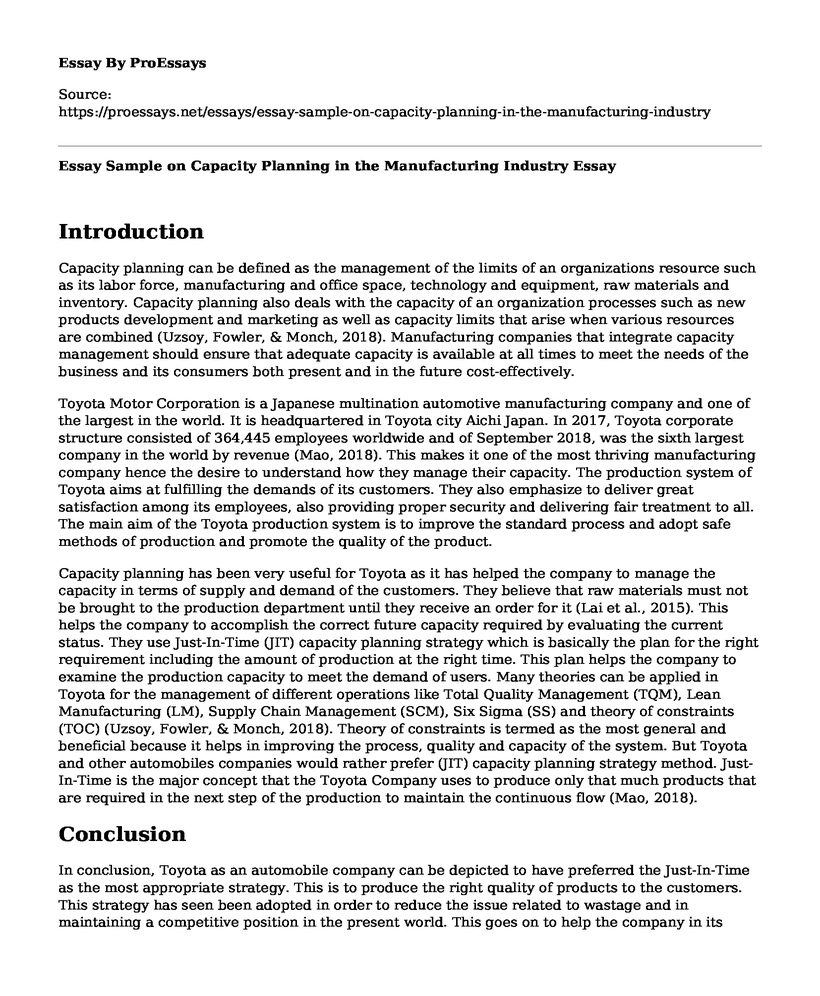Introduction
Capacity planning can be defined as the management of the limits of an organizations resource such as its labor force, manufacturing and office space, technology and equipment, raw materials and inventory. Capacity planning also deals with the capacity of an organization processes such as new products development and marketing as well as capacity limits that arise when various resources are combined (Uzsoy, Fowler, & Monch, 2018). Manufacturing companies that integrate capacity management should ensure that adequate capacity is available at all times to meet the needs of the business and its consumers both present and in the future cost-effectively.
Toyota Motor Corporation is a Japanese multination automotive manufacturing company and one of the largest in the world. It is headquartered in Toyota city Aichi Japan. In 2017, Toyota corporate structure consisted of 364,445 employees worldwide and of September 2018, was the sixth largest company in the world by revenue (Mao, 2018). This makes it one of the most thriving manufacturing company hence the desire to understand how they manage their capacity. The production system of Toyota aims at fulfilling the demands of its customers. They also emphasize to deliver great satisfaction among its employees, also providing proper security and delivering fair treatment to all. The main aim of the Toyota production system is to improve the standard process and adopt safe methods of production and promote the quality of the product.
Capacity planning has been very useful for Toyota as it has helped the company to manage the capacity in terms of supply and demand of the customers. They believe that raw materials must not be brought to the production department until they receive an order for it (Lai et al., 2015). This helps the company to accomplish the correct future capacity required by evaluating the current status. They use Just-In-Time (JIT) capacity planning strategy which is basically the plan for the right requirement including the amount of production at the right time. This plan helps the company to examine the production capacity to meet the demand of users. Many theories can be applied in Toyota for the management of different operations like Total Quality Management (TQM), Lean Manufacturing (LM), Supply Chain Management (SCM), Six Sigma (SS) and theory of constraints (TOC) (Uzsoy, Fowler, & Monch, 2018). Theory of constraints is termed as the most general and beneficial because it helps in improving the process, quality and capacity of the system. But Toyota and other automobiles companies would rather prefer (JIT) capacity planning strategy method. Just-In-Time is the major concept that the Toyota Company uses to produce only that much products that are required in the next step of the production to maintain the continuous flow (Mao, 2018).
Conclusion
In conclusion, Toyota as an automobile company can be depicted to have preferred the Just-In-Time as the most appropriate strategy. This is to produce the right quality of products to the customers. This strategy has seen been adopted in order to reduce the issue related to wastage and in maintaining a competitive position in the present world. This goes on to help the company in its capacity planning also by ensuring that they manage their labor force well as well as space available for operations. It can be said that capacity planning as a general term can be effectively used in all management of resources in a company to achieve the best outcome in manufacturing industries.
References
Lai, S. Y., Tsai, C. H., Wei, L. Y., Li, R. K., & Lu, M. J. (2015). The dilemma of Toyota Production System implementation: a case study of Taiwan machine tool industries. International Journal of Academic Research in Accounting, Finance and Management Sciences, 5(1), 1-12.
Mao, C. (2018). Research on competitive advantages of supply chain based on its time competition: a Case analysis of the automobile industry.
Uzsoy, R., Fowler, J. W., & Monch, L. (2018). A survey of semiconductor supply chain models Part II: demand planning, inventory management, and capacity planning. International Journal of Production Research, 56(13), 4546-4564.
Cite this page
Essay Sample on Capacity Planning in the Manufacturing Industry. (2022, Nov 11). Retrieved from https://proessays.net/essays/essay-sample-on-capacity-planning-in-the-manufacturing-industry
If you are the original author of this essay and no longer wish to have it published on the ProEssays website, please click below to request its removal:
- Advice to MB on the Potential Liability to the Unfair Dismissal
- FreshDirect Statement of Business Problem or Opportunity
- Paper Example on Comparing Management Styles of Steve Jobs and Tim Cook at Apple Inc
- Team Charters: Roadmaps to Successful Progress - Essay Sample
- Paper Example on Struggle for Power & Supremacy: Who's Ahead?
- Essay Example on Interpersonal, Verbal & Written Communication: Strengthening Relationships
- Organizational Mineral Management - Report Sample







